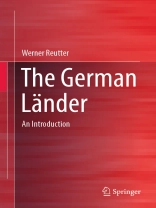The textbook looks at the German federal state from the perspective of the Länder. It provides information on the development of the German Länder, analyzes their significance for democracy, the federal state and the rule of law, and introduces the central principles of politics in the Länder. It offers those interested in politics, teachers and students of political science, social science, law and the humanities a comprehensive as well as condensed overview of the German Länder.
This book is a translation of the original German 1st edition, Die deutschen Länder by Werner Reutter, published by Springer Fachmedien Wiesbaden Gmb H, part of Springer Nature in 2020. The translation was done with the help of artificial intelligence (machine translation by the service Deep L. com). A subsequent human revision was done primarily in terms of content, so that the book will read stylistically differently from a conventional translation. Springer Nature works continuously to further the development of tools for the production of books and on the related technologies to support the authors.
Tabla de materias
Introduction: the German states between diversity and unity.- The states: how they became what they are.- The federal government and the states: constitutional foundations and political science explanations.- Representative and direct democracy in the states: Complement or contradiction?.- Parties and party systems in the Länder.- Parliaments, governments and constitutional courts: division of powers in the Länder.- The Länder in the Federation and in Europe.- The Länder and democracy in the German federal state.
Sobre el autor
Priv. Doz. Dr. Werner Reutter is a political scientist at the Humboldt University in Berlin.












